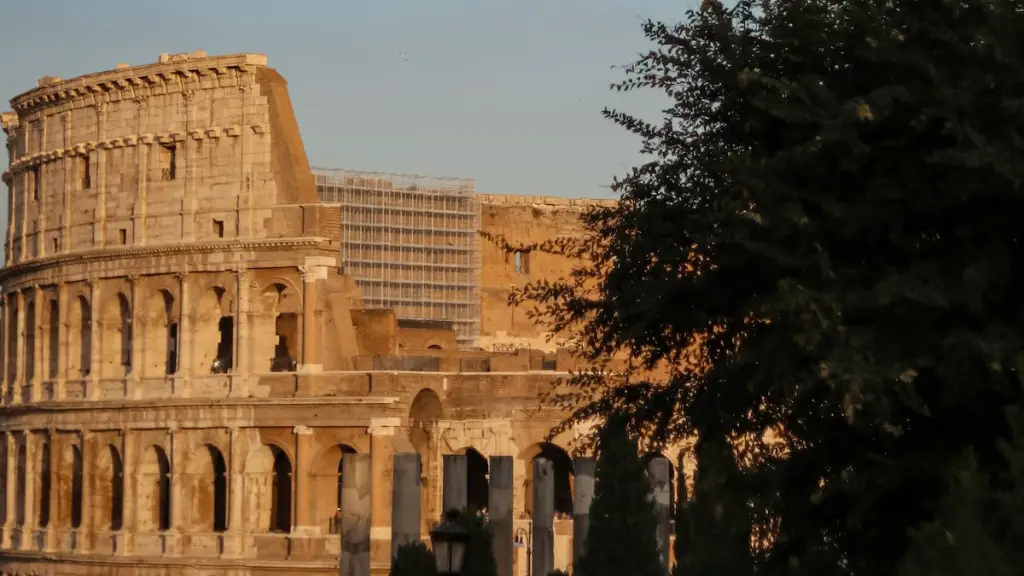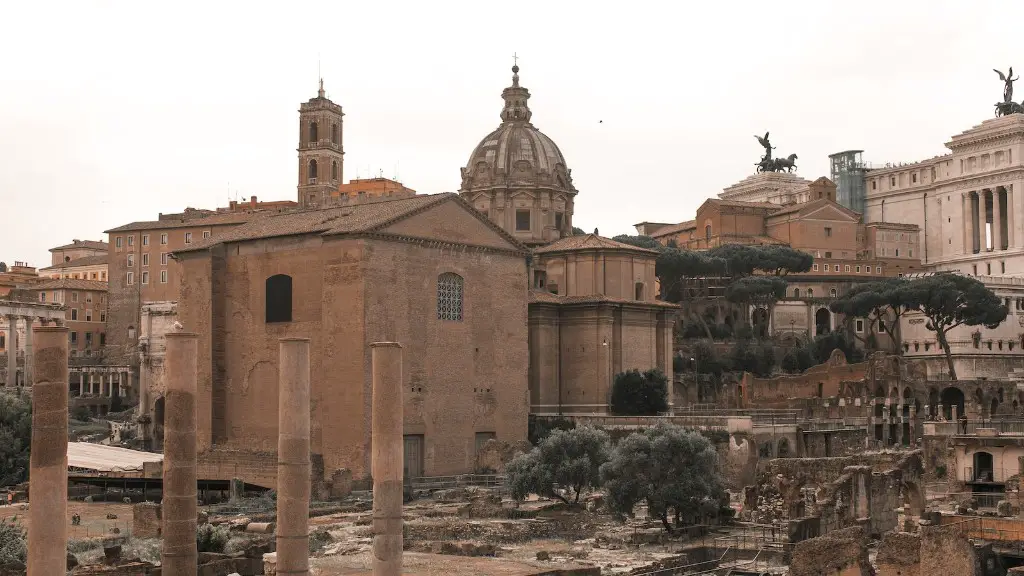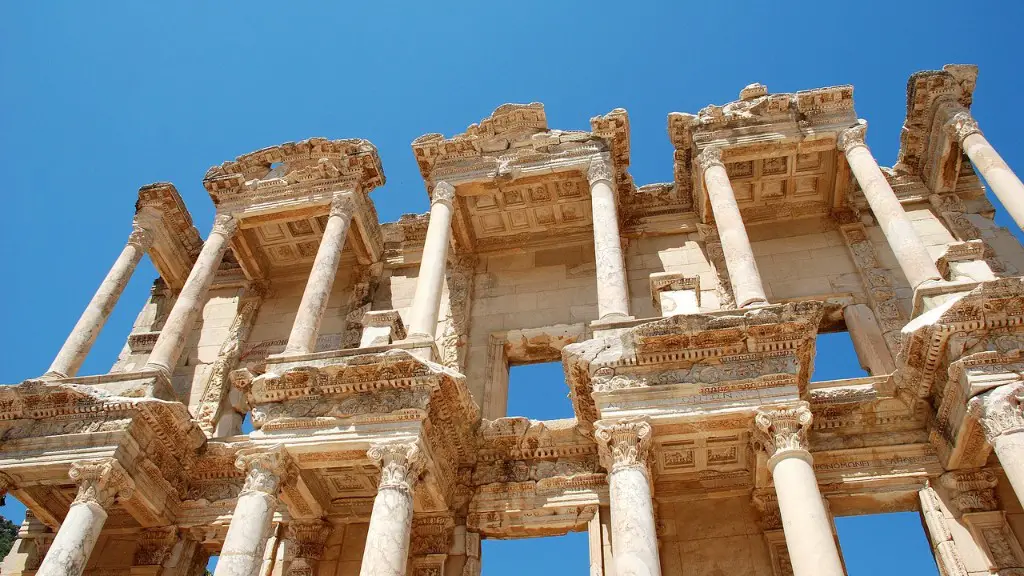Polytheism
Polytheism was the dominant religion among Ancient Romans. The religion was based on multiple gods and goddesses who were responsible for different aspects of life. The most prominent of the gods and goddesses in the Roman pantheon were Jupiter, the king of the gods, Juno, the queen of the gods and the patron goddess of women, Mars, the war god, Venus, the goddess of love and beauty, and Minerva, the goddess of wisdom. The romans performed numerous rituals to honor these gods and believed in their power and influence. For example, a common ritual was to offer sacrifices of animals and food to please the gods.
The ancient Romans had a variety of cults, each with a different god or goddess. Roman religion was highly ritualistic, with many holidays and festivals dedicated to the worship of their gods and goddesses. The most important festivals were the Saturnalia, a celebration of the god Saturn, and the Ludi, a celebration of the god Jupiter.
In addition to the gods that were part of their main pantheon, the Ancient Romans also worshipped other deities from foreign cultures, such as the Egyptian goddess Isis, the Greek god Apollo and the Etruscan deities. Worship of these deities often provided the opportunity for interaction and trade between the various cultures that were a part of the Roman Empire.
Mystery Cults
In addition to the traditional religious practices, Ancient Rome also had a number of mystery cults. Mystery cults were religious organizations that focused on the worship of a particular god or goddess and focused on secret rituals and activities. The most popular of these cults was the cult of Dionysus, the god of wine, which involved secret ceremonies and orgiastic rituals. Other mystery cults included the cult of Isis, the cult of Mithras and the cult of Cybele.
These cults often held their rituals in private underground chambers and were shrouded in mystery and secrecy. These cults were popular among the wealthier members of society and provided an escape from the rigidity of Roman culture. Members of the cults often believed that they could gain salvation through the worship of their particular god or goddess.
Although these cults were popular in Roman society, there were also attempts to suppress them due to their perceived danger to the traditional values held by the Roman government. Despite this, mystery cults continued to be popular throughout the period of the Roman Empire.
Judaism
Judaism was another religion that was present in Ancient Rome. The Jews had been present in the region since the time of the Babylonian Exile in the sixth century B.C. and had a significant presence in Roman society. The Jews had their own religion and traditions, which were often seen as strange or backward by Roman society.
The Jews were often oppressed in Roman society and were not truly welcomed until the reign of Emperor Nerva in the first century A.D. The situation improved under his rule, and Jews were given more freedom to practice their religion and cultural traditions. Despite this, Jews still faced discrimination and legal restrictions from Roman society.
The Jewish religion itself was little changed in ancient Rome. The main belief of Judaism was monotheism, the belief in one god, which was in contrast to the polytheism of the Romans. Jewish practices such as the observation of the Sabbath and the prohibition of pork were still observed in the Roman period.
Roman Religion
The ancient Romans had their own religion, which was based on the classical gods and goddesses of Greek mythology. This religion was intertwined with Roman government and society and was deeply entwined with traditional Roman values. The main god in this religion was Jupiter, the king of the gods, who was believed to be the guardian of Rome. The worship of other gods and goddesses was also present, such as Mars, the god of war, Juno, the patron goddess of women and Venus, the goddess of love and beauty.
The traditional Roman religion was a important part of everyday life in Ancient Rome and was deeply entwined with politics. Sacrifices to the gods were conducted regularly by the Roman government and priests, and festivals were held in honor of the gods. These festivals were highly ritualistic and often involved elaborate processions and public displays.
The Roman religion was eventually replaced by Christianity in the fourth century A.D., and eventually ceased to be the official religion of Rome. However, it still continues to influence modern beliefs and practices and is considered one of the most influential religions in history.
Myths
Myths were an integral part of Roman culture and religion, and many of the stories told by the Ancient Romans were based on Greek mythology. The myths of Rome were often used as a way to explain natural phenomena, such as thunderstorms and eclipses, as well as to explain the origin of different laws and customs.
Many of the gods and goddesses in the Roman pantheon were based on earlier Greek gods and goddesses, and the stories told about them were often similar to those in the Greek myths. The most prominent of these gods was Jupiter, the king of the gods, who was based on the Greek god Zeus. Other gods in the Roman pantheon such as Mars, Juno, Venus and Minerva were based on the Greek gods Ares, Hera, Aphrodite and Athena, respectively.
The myths of the Ancient Romans were an important part of their culture, and they were often depicted in art and literature. They were also used as an educational tool to instill moral values in children. The myths of Ancient Rome continue to influence Modern culture, art and literature, and many of the stories have modern retellings.
Legacy
The religions of Ancient Rome have left a lasting legacy in modern society. Despite the decline of the traditional Roman religion and the rise of Christianity in the fourth century, many of the aspects of the religion still remain in modern beliefs and practices. The traditional gods and goddesses of Rome are still alive in many aspects of popular culture, such as in comic books, video games and movies.
In addition, many of the traditional values and beliefs of Rome, such as the importance of family, the belief in justice and the idea of honor, still persist in modern society. Finally, the more secretive and exotic mystery cults of Rome still have an influence on modern occult practices.
Conclusion
The religions of Ancient Rome had a deep and lasting influence on modern society. The traditional gods and goddesses are still prominent in popular culture, and many of the values and beliefs of Rome still exist in modern society. The mystery cults of Rome also continue to have a influence on modern occult practices. All of these aspects serve to remind us of the rich history of Ancient Rome and its lasting influence on the present day.




